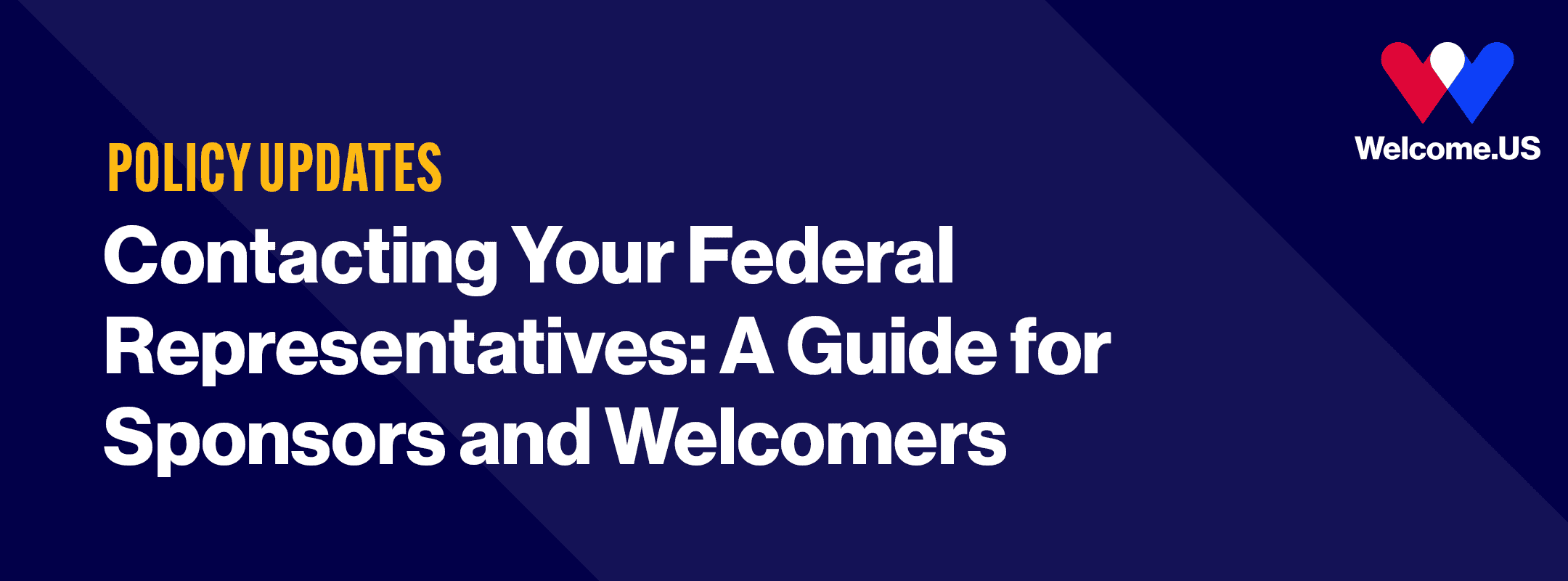Contacting Your Federal Representatives: A Guide for Sponsors and Welcomers

Private sponsorship programs provided safe, legal, and community-led pathways to welcome newcomers. As policies have effectively ended these programs, Welcomers nationwide are contacting Congress to make their voices heard.
Make your voice heard
Our easy-to-use tools help you to either call or send a message to your representatives in support of sponsorship.
Call to support legal pathwaysHigh impact!
Tell your representative: Please support communities like mine who welcomed newcomers seeking safety by supporting policies for safe and legal sponsorship programs.
Make a callEmail to support legal pathwaysSend a quick message
Tell your representative: Please support communities like mine who welcomed newcomers seeking safety by supporting policies for safe and legal sponsorship programs.
Send a messageEmail to support U4U and CHNVSend a quick message
Send a message specifically in support of the humanitarian parole programs Uniting for Ukraine or the Processes for Cubans, Haitians, Nicaraguans, and Venezuelans.
Send a messageGet help with a case
If the newcomer you’ve sponsored has a pending immigration-related application, you can contact your federal representative’s local office and give them permission to check with the federal agency managing the case.
Learn more

Get help with a case
Who this is for: Sponsors who have pending immigration-related applications, including re-parole, Temporary Protected Status, and work authorization.
Why contact your representative?
If the newcomer you’ve sponsored has a pending immigration-related application, you can contact your federal representative’s local office and give them permission to check with the federal agency managing the case. Your representatives are able to contact U.S. Citizenship and Immigration Services (USCIS) on your beneficiary's behalf to check on case status and potentially identify any issues causing delays.
What your representative can help with
- Accelerate the normal processing time; they can't move your case ahead of others.
- Guarantee approval of your application.
- Change immigration policies or requirements.
- Override agency decisions about your case.
- Make eligibility determinations; the immigration agency still makes all final decisions.
When to contact your representative
- Before reaching out, check the current processing times on the USCIS website for your specific application type. Each case type (re-parole, work authorization, etc.) has different standard processing timeframes.
- Consider reaching out if your case has exceeded the normal processing time by 30-60 days, or if you haven't received any updates for several months after submitting your application. Immediate contact situations:
- If USCIS sent you a Request for Evidence and you need help understanding it.
- If there's an urgent need (e.g., legal status or work authorization expiring soon).
- If you've submitted additional documents to USCIS as part of your case but received no acknowledgment.
STEP-BY-STEP GUIDE TO GETTING HELP WITH A CASE
Step 1: Gather your information before calling
- Your information: Gather your full name, address, and contact information to establish that you are a constituent and documentation of any correspondence with USCIS
- Case details: Full legal name of the person you are sponsoring Receipt number or application number for the relevant sponsorship case, if applicable Specific agency or office handling the case
- Timeline of key dates (application submission, biometrics appointment, etc.).
Step 2: Contact your representative's office
a. Find your representative using the link provided here.
Which representative should you contact? When you search for your representatives, you'll see three results: two U.S. Senators and one member of the House of Representatives. All three can help with immigration casework, so here's how to decide:
- Start with your House representative. They represent smaller districts with fewer total constituents and may respond faster.
- You can also contact your senators. Senators represent the entire state and often have larger casework teams.
- If one office is unresponsive: Don't hesitate to reach out to the other representatives. Each office operates independently and may have different response times. Some people find success contacting all three offices simultaneously.
b. Call and/or email their local office (not the main Washington office) requesting a privacy release form for a constituent inquiry. Here is a sample message you can use:
Hello, I am a constituent and need help with a pending [RE-PAROLE; TPS; EMPLOYMENT AUTHORIZATION OR OTHER] case. My name is [NAME] and I live in [TOWN/CITY].
I am contacting you to request an update on my case. My beneficiary's application has been in process for [NUMBER] months. Please tell me how I can file a privacy form in order to work with you on this matter. Their case number is [CASE NUMBER].
Our sponsorship group includes [NUMBER] of long-time residents of [TOWN/CITY]. We have worked very hard to welcome this family and appreciate anything that you can do to help us with their case, given the urgency.
I’m grateful for your time and look forward to hearing from you soon. You can share the privacy form instructions with me at [YOUR EMAIL ADDRESS].
c. Submit the privacy form. You'll need to fill this out so your representative’s office can inquire about your case on your behalf. Here is an example.
What happens after submitting the form?
- The representative's office will confirm they received your completed privacy form.
- Your case will be assigned to a caseworker who specializes in immigration matters.
- The caseworker will submit an official congressional inquiry to USCIS on your behalf.
Step 3: Follow up
Response time from your representative's office:
- Most offices will acknowledge your initial inquiry within 3-5 business days.
- Privacy release form: You should receive the privacy form within 1 week of your initial inquiry.
- After submitting the privacy release form, the representative’s office will contact USCIS and get back to you with an update. This process typically takes 2-4 weeks.
- If you haven't heard back in 3-4 weeks after submitting the privacy form, it's appropriate to follow up with the representative's office.
Call back for updates. Persistence is okay! Provide additional information if requested.

